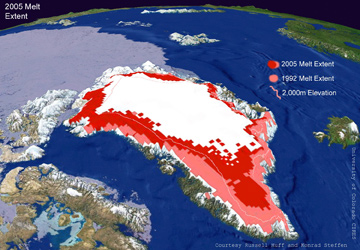Al Gore shares Nobel Peace Prize with climate body
Al Gore shares Nobel Peace Prize with climate body
mongabay.com
October 12, 2007
Former U.S. Vice President Al Gore and the United Nations Intergovernmental Panel on Climate Change (IPCC) won the 2007 Nobel Peace Prize for their efforts to build awareness about human-induced climate change. Gore and the IPCC, a body of climate scientists, will each receive about $1.5 million.
The Nobel committee cited Gore and the IPCC “for their efforts to build up and disseminate greater knowledge about man-made climate change, and to lay the foundations for the measures that are needed to counteract such change.”
“Through the scientific reports it has issued over the past two decades, the IPCC has created an ever-broader informed consensus about the connection between human activities and global warming,” Ole Danbolt Mjoes, chairman of the Nobel committee, said. “Thousands of scientists and officials from over 100 countries have collaborated to achieve greater certainty as to the scale of the warming.”
 Melting of the Greenland ice Sheet in 1992 and 2005. Graphic by Konrad Steffen and Russell Huff of the Cooperative Institute for Research in Environmental Sciences (CIRES) at the University of Colorado at Boulder |
“His strong commitment, reflected in political activity, lectures, films and books, has strengthened the struggle against climate change,” said the citation. “He is probably the single individual who has done most to create greater world-wide understanding of the measures that need to be adopted.”
It continued that Gore “has for a long time been one of the world’s leading environmentalist politicians” and cited his awareness at an early stage “of the climatic challenges the world is facing.”
FULL TEXT OF THE CITATION: The Nobel Peace Prize for 2007
The Norwegian Nobel Committee has decided that the Nobel Peace Prize for 2007 is to be shared, in two equal parts, between the Intergovernmental Panel on Climate Change (IPCC) and Albert Arnold (Al) Gore Jr. for their efforts to build up and disseminate greater knowledge about man-made climate change, and to lay the foundations for the measures that are needed to counteract such change.
Indications of changes in the earth’s future climate must be treated with the utmost seriousness, and with the precautionary principle uppermost in our minds. Extensive climate changes may alter and threaten the living conditions of much of mankind. They may induce large-scale migration and lead to greater competition for the earth’s resources. Such changes will place particularly heavy burdens on the world’s most vulnerable countries. There may be increased danger of violent conflicts and wars, within and between states.
Through the scientific reports it has issued over the past two decades, the IPCC has created an ever-broader informed consensus about the connection between human activities and global warming. Thousands of scientists and officials from over one hundred countries have collaborated to achieve greater certainty as to the scale of the warming. Whereas in the 1980s global warming seemed to be merely an interesting hypothesis, the 1990s produced firmer evidence in its support. In the last few years, the connections have become even clearer and the consequences still more apparent.
Al Gore has for a long time been one of the world’s leading environmentalist politicians. He became aware at an early stage of the climatic challenges the world is facing. His strong commitment, reflected in political activity, lectures, films and books, has strengthened the struggle against climate change. He is probably the single individual who has done most to create greater worldwide understanding of the measures that need to be adopted.
By awarding the Nobel Peace Prize for 2007 to the IPCC and Al Gore, the Norwegian Nobel Committee is seeking to contribute to a sharper focus on the processes and decisions that appear to be necessary to protect the world’s future climate, and thereby to reduce the threat to the security of mankind. Action is necessary now, before climate change moves beyond man’s control.
Oslo, 12 October 2007














